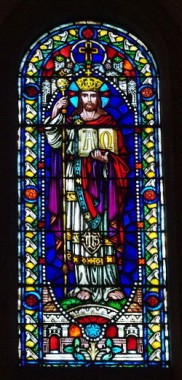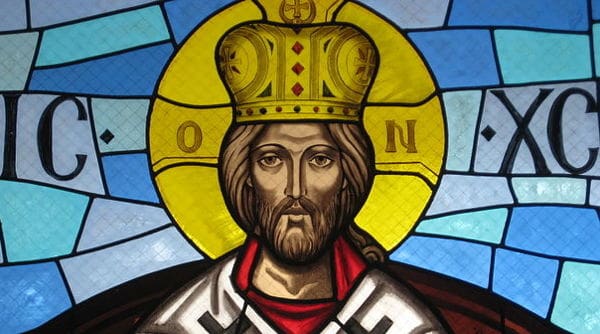I posted this over at the National Catholic Register – thought you would appreciate it…
 Each year the ornaments, greenery, and tinsel make an earlier appearance. One laments the distortion of autumn and Thanksgiving under the ever-growing Christmas hegemony. Still, another commonly overshadowed event will come and pass this Sunday, the feast of The Kingship of Our Lord Jesus Christ.
Each year the ornaments, greenery, and tinsel make an earlier appearance. One laments the distortion of autumn and Thanksgiving under the ever-growing Christmas hegemony. Still, another commonly overshadowed event will come and pass this Sunday, the feast of The Kingship of Our Lord Jesus Christ.
In 1925 the celebration of Christ the King was instituted by Pope Pius XI in his encyclical Quas Primas. For many Catholics the feast day approaches with little to no grandeur, and the celebration of the Lord’s Kingship is another ephemeral Sunday before the dawn of Christmas. Still, the Feast of Christ the King is just that, a feast. Though a hackneyed term in the Catholic mind, Catholics must remember that a feast is a call for contemplation and celebration. The Vicar of Christ, our Holy Father, Pope Pius XI asked the Church to establish a feast in honor of Christ’s Kingship. In his words, the feasts of Holy Mother Church “affect both mind and heart, and have a salutary effect upon the whole of man’s nature,” because humanity “needs these external festivities so that the sacred rites, in all their beauty and variety, may stimulate him to drink more deeply of the foundation of God’s teaching.” And among the offerings of the Church, the Christ the King feast has a unique medicinal flavor. The Vicar of Christ then and now offers the Church “an excellent remedy for the plague which now infests society,” the scourge of secularism.
The burgeoning symptoms of the world as observed by the Holy Father are unfortunately not uncommon to our own. Our nations still hemorrhage from the wounds of “anticlericalism” and its “impious activities.” Anticlericalism is of course the opposition of clergy, i.e., the Church, to influentially speak into society, and especially into politics. The Holy Father notes this disease has been percolating in the modern hearts of men, and has “long lurked beneath the surface.” The visible effect of this virus was that the “empire of Christ over all nations was rejected.” The respect nations held for the moral authority of the Church waned and became a tenuous connection to the political moral body. The loss of favor for the Church resulted in Catholicism being “likened to false religions and to be placed ignominiously on the same level with them.” The flattening of all religions to an equal level devalued the voice of Christ and his Church, because the voice was seen as just another religious voice among the relative choir.
In the current struggles against the State it seems almost asinine for Catholics to admonish the State for not recognizing the superior moral voice of the Church. The recent engagements between the Church and the State have Catholics finding themselves without a voice or being told what that voice can and cannot sound like. Yet, the Catholic truth is not relative to the shortcomings of the State. The faithful must remember the full glory of Christ and his Church, even if Catholics find themselves carving out the meekest of religious liberties.
Pope Pius XI and his words beg Catholics to remember the splendor of Christ’s supremacy and power. In Jesus Christ, the Eternal King, “is the salvation of the individual, in him is the salvation of society.” The empire of Christ is not limited to the Catholic faithful, but also includes lapsed Catholics, schismatic Christians, and all “those who are outside the Christian faith.” In short, “the whole of mankind is subject to the power of Christ.” The reality of the world is that all humanity is subject to the monarchy of Christ, and that his Kingdom on Earth is stewarded by the Pope, the Vicar of Christ the King.
As the bishops and princes of the Church muster their forces and gather the banners of religious liberty together, Catholics must first ensure that the regal voice of Christ resonates in their hearts. The faithful cannot proclaim a voice to the world to which they themselves are deaf. The emergence of all the Christmas décor cannot overshadow the importance of the Christ the King. The season of Advent brings with it sweet recollections of the meekness of Christ and his tender mercy for all humanity. However, the babe in swaddling clothes now sits at the right hand of the Father. The salutary cup of Christ the King is one of dominion and obedience. The feast Pope Pius XI calls the Church to remember is in many ways the feast of our age. In the midst of the current multi-front standoff with the State, the words of Quas Primas still ring true:
But if the faithful were generally to understand that it behooves them ever to fight courageously under the banner of Christ their King, then, fired with apostolic zeal, they would strive to win over to their Lord those hears that are bitter and estranged from him, and would valiantly defend his rights.
O Jesus, our Eternal King, Reign in our hearts.
O Jesus, Most Merciful King, Reign in our hearts.
O Jesus, extending to us the Golden Scepter of Your Mercy, Reign in our hearts.
More about Christ the King
Litany of Christ the King
+
Art: Detail from Immaculate Conception Church (Columbus, Ohio) – stained glass, Virgin Mary & Christ the King, Nheyob, own work, April 12, 2014, CC by SA, Wikimedia Commons. Feature image: Stained glass window at the Melkite Catholic Annunciation Cathedral in Roslindale [Boston] depicting Christ the King with the regalia of a Byzantine emperor, photographed by John Stephen Dwyer, January 25, 2009, CCA-SA 3.0 Unported, Wikimedia Commons.




